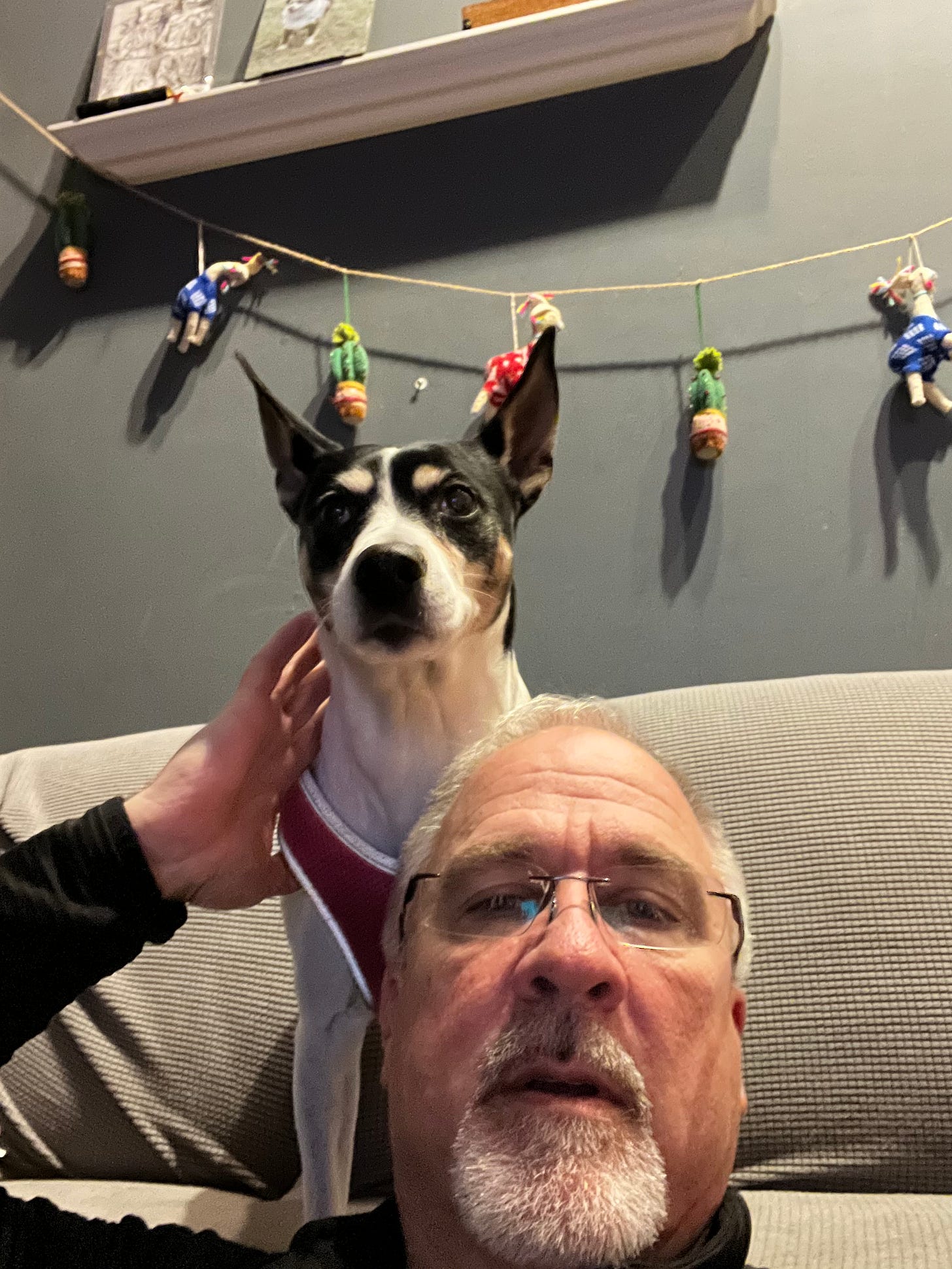Attendance is not a problem here
How humanities teacher Joe Bowe engages high schoolers (complete with artifacts)
Attendance has been much in the news of late as districts are reporting higher absentee rates compared to pre-pandemic levels. That hasn’t been an issue at the Manchester School of Technology in Manchester, N.H., where a competency-based high school program was added to an existing regional career and technical center 10 years ago.
Joseph (Joe) Bowe was in his first teaching job at the school, working in a credit recovery program, and he became an integral part of the transition. Formerly the director of global sourcing for the Malden Mills textile company, Joe had decided to switch careers and give back to his community by teaching disadvantaged students. At MST, he now teaches Humanities 1 and 2 to 9th and 10th graders.
In an animated Zoom conversation — with occasional appearances by his rescue dog, Bella — I spoke to Joe about how he structures his classroom and brings in real-world experiences to keep his students engaged.
This interview has been edited and condensed.
Nancy: You've been a part of Manchester's experiment with CBE (Competency-Based Education) for a little over 10 years. Can you tell us a little bit about that journey?
Joe: I had been teaching for three or four years when they decided to close down the PASS program that I was in. I had kids who were 18 years old, working to get a high school diploma, and the district leaders said, we're going to close this but we're going to open up a four-year high school at the trade center where I was working and we’re going to do it with CBE. I said, I’m all in, because there’s no better way to go about education than that.
My degree in college was political science, and I was buying a billion cubic feet of natural gas and 60 million pounds of polyester every year. What does that have to do with political science? Absolutely nothing except that I knew how to learn. I thought about all the people that I had hired to work with me. I never once asked about a G.P.A. or traditional academics. I asked for references, and I asked those people, how are these people to work with? Do they work well with others? All the things that you really need to hold down a job and to get things done. And that was really when the light went on.
For me, things never really changed because the kids I was working with didn't give a care about grades initially. They just wanted to get credit, and I would have them demonstrate to me — in any variety of ways — that they understood what was going on and got the gist of it. So that kind of fed right in, really naturally for me, to the CBE stuff. And so right off the bat, I abandoned the 0-100 or the A-B-C-D-F thing and got to work figuring out how these guys in the new four-year program could demonstrate learning. I'm fairly certain that other than the New Hampshire citizenship test, I don't think I've given a test in 15 years.
Nancy: Really?
Joe: Yep, it’s all projects. And really the most rewarding thing that's happened so far is that our school, which opened in 2012, has the same or higher graduation rate as the three other high schools. And as a percentage of kids that go to college, ours go at the same rate. And we don’t do six seats in a row, five rows across the classroom and open the book and go to this page and go chapter by chapter by chapter. We don’t even have textbooks. We just don't use 'em.
Joe Bowe and Bella [Photo by Joseph Bowe]
Nancy: Talk about that a little bit, structurally. How does your classroom differ from a traditional classroom?
Joe: One of the first things we did was to say, okay, let's break down the walls between classes and curriculum. We started a humanities program. For the freshman year, we combined world history and civics and English. You can't do social studies without being able to read, and lots of kids don't really want to just read to read. It has to have context. It has to have meaning to them.
World history at the high school level usually covers ancient history and some middle ages. We decided to approach it through a civic lens from the standpoint of this is the United States of America and we have a representative form of government. We look at the structures that were put in place over time to create states — in Rome, Greece, the Middle East, China and India — all of which contributed in the end to the forming of this country. We emphasize all the time, nothing happens in a vacuum.
We also emphasize all the time that English is really important; that you can read and write and communicate effectively with others, and that those are skills. Every time a student says to us in our class, why am I doing this, we always have it in context. We can explain that. So you're not having that fight.
Nancy: Can you give me an example of how you teach through projects?
Joe: We start first with a goofy little thing we call The Cheese Project. Everyone has an opinion about cheese in one way, shape, or form. So, we use this fact to introduce research by saying, pick a cheese and I want to know everything about it. And the first thing that you're going to do is you're going to pick one cheese from any continent except Antarctica. They don't have cheese there. Sorry guys.
Keep reading with a 7-day free trial
Subscribe to Teachable Moments to keep reading this post and get 7 days of free access to the full post archives.




